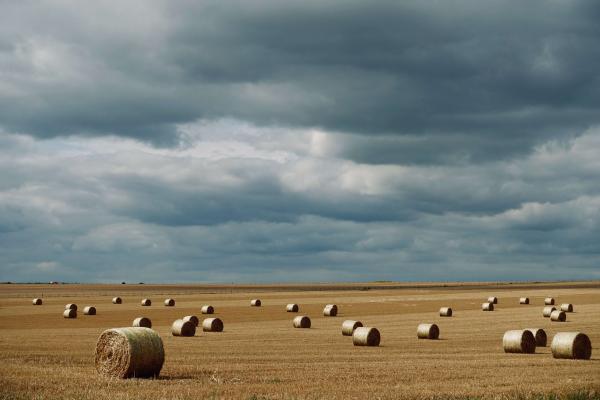It’s mid-September in Kentucky and there’s just a hint of crispness in the air. My husband and I are driving through fields of corn, tobacco, cattle, and hay. We’re headed to his father’s farmhouse near the center of the state, miles away from family, friends, or anyone, really.
I find myself pulling out my phone to Google — for the upteenth time this week — “Rosh Hashanah 2020” to make sure I have the date right. There’s no reception, but I know it’s tonight. It just doesn’t feel like it.
Last year I was too busy to plan the holiday, crushed between days of working at a theater, evenings of bartending, and weekends vending at the Renaissance Faire. I figured maybe it was just a year without the usual feasting and celebration. I barely had time enough to sleep, let alone make brisket and apple cake. Flying home to family was even more unimaginable. It’s OK if I just go to temple, I thought — there’s always next year.
There’s a Yiddish saying, “Mann Tracht, Un Gott Lacht”: Man plans, and God laughs.
As it happens, I spent last year’s Rosh Hashanah held in community. My husband and the rest of our Frambly had planned a surprise celebration, each pitching in something, from the chairs to the challah, and I was brought to tears by the fact that the people who love me — many of whom aren’t Jewish themselves — made the holiday for me when I needed it most.
This year? Well, this year is this year. The year that nothing went to plan.
The idea of returning, home to loved ones, back to traditions, even back to the self, is central to the Jewish New Year celebrations of Rosh Hashanah and Yom Kippur. This year, the journey home truly cannot be made. We cannot gather in space with friends, or as a congregation. But as a friend of mine recently quipped, “This is hardly the worst way our ancestors have had to mark a holiday.” If a shofar can be sounded in Auschwitz, how can we complain about the awkwardness of celebrating the new year via Zoom?
I was lucky enough to grow up in a big Jewish family that celebrated Rosh Hashanah with two nights of epic feasts and long visits with family and friends. It’s a tradition I am honored to carry, even when I am baffled by how to do so. Even when others have to carry it for me.
Watching the hills roll by the window, hay bales standing sentinel at the end of the season, I am reminded that Judaism is the rare tradition that celebrates new years in the fall instead of near the winter solstice or in spring. Though it seems odd to celebrate the start of something new as the year’s bounty is winding down, from an agricultural perspective, it makes sense. It takes time to wrap up a season’s growth and get ready for next year. The first shoots of spring are only possible because of what was tended to in the fall.
In Jewish mythology, the turn of the year is a process, like turning over a field, with our deeds throughout the past year becoming fodder for the seeds of what is to come. It starts with Rosh Hashanah, with the blast of the shofar, stretches through the Days of Awe, and concludes on Yom Kippur, the Day of Atonement, 12 days in total that make up the High Holy Days.
The holiday liturgy is filled with ornate language that paints God in many ways: as Shepherd, as Judge, as Parent, as Sovereign, but my favorite among them is God, the Author. For a religion that can be called humanity's longest running book club, it should come as no surprise that our imagining of the divine realm includes a heavenly library. According to Jewish mystic tradition, Rosh Hashanah is when God opens the Book of Life, and studies the past year. Based on what we write there through our actions, God makes an outline of what comes next.
The Unetanah Tokef is a harrowing poem, likely from the Byzantine era, written by an unknown author. Although it does not appear in the Torah or the Talmud, it is a central reading during the High Holy Days. “On Rosh Hashanah it is written,” the author begins, “On Yom Kippur it is sealed.” The poem goes on to list all the possibilities for the year to come, from abundance, joy, and peace, to destitution, destruction, and a cornucopia of unpleasant deaths. But the last line assures us that Teshuva (repentance), Tefillah (prayer), and Tzedakah (righteous action) have the power to change our fate — to influence the divine author’s pen.
The Days of Awe are a time of repairing relationships, reaffirming commitments, rededicating ourselves to righteous action. By Yom Kippur, the ink is drying, the book is closing, the year will be shelved. We spend the day in temple, or in quiet meditation, and traditionally, we fast, focusing all our energy on who we want to be, and what we want the next year to look like. We repent, we pray, we promise to do good.
Notably, while much is written about the celestial court on Yom Kippur, there is remarkably little focus on the afterlife. There is no guarantee of divine reward for our goodness, nor threat of eternal punishment for our misdeeds. And yet, we are instructed each year, to stop the busyness of our lives, contemplate our own mortality, and make concrete changes based on our conclusions. One might wonder, why bother?
When composing a Yom Kippur sermon, many rabbis will tell their congregants of Rabbi Zusya, the 18th century Polish scholar, who was troubled at the end of his life, by the prospect of divine judgement. His students assured Zusya that he had been an excellent teacher and a humble and wise student of the Torah.
“You were as good as Moses, Zusya, as good as Soloman and David!” They cried.
Uncomforted, Zusya replied, “But when I am asked to account for my life before the heavenly court, I will not be asked why wasn’t I more like Moses, Solomon, or David, I will be asked why I wasn’t more like Zusya.”
Zusya reminds us that God doesn’t just want our obedience or our guilt, God wants us to fulfil our potential as well. The Days of Awe aren’t just a time to bargain with God for our own prosperity — they are an urgent reminder that in a world full of factors we cannot control, it is still up to each of us to master ourselves, and to devote time and energy to doing so. To find time for awe.
It would be easy to dismiss this year’s High Holy Days as a loss. We cannot gather, we cannot worship as we normally do, we cannot even share a meal. But in some ways, these limitations only serve to highlight the message of the season. We must actively disrupt the rhythms of our habits if we want to make effective changes in ourselves, and what better time than now, to do the same in the broader world? The normal that we took for granted — was it just and good? Or merely comfortable and familiar? Did our actions live up to our ideals? Were we our best selves? And if not, how do we build a better normal on the other side of this?
This year, my Rosh Hashanah celebrations are simple. A loving husband, a safe place to rest, apples dipped in honey. And yet, it is enough, for the days are filled with awe.
Got something to say about what you're reading? We value your feedback!







